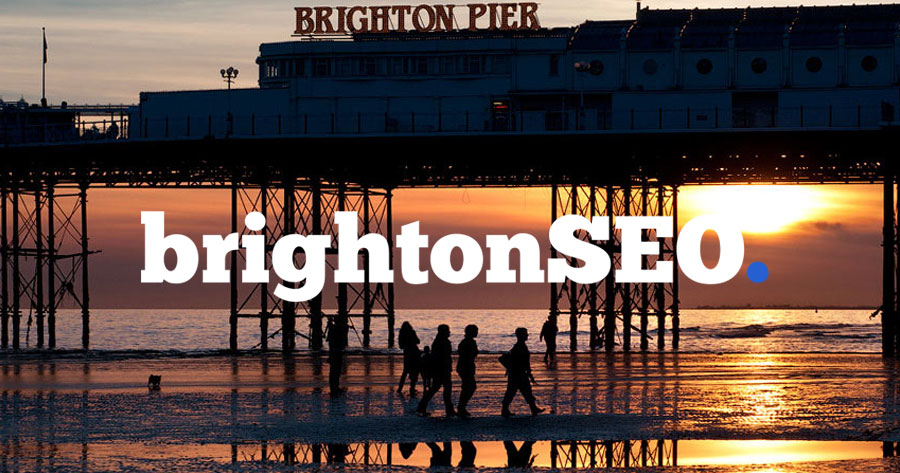Last Friday, I was in Brighton for the Brighton SEO conference. It was quite a change for me. I’ve been going to technical conferences for about twenty years or so, but the ones I go to tend to be rather grass-roots affairs like YAPC or Opentech. Even big conferences like FOSDEM have a very grass-roots feel to them.
Brighton SEO is different. Brighton SEO is a huge conference and there is obviously a lot of money sloshing around in the SEO industry. I’ve been to big technical conferences like OSCON, but tickets for conferences like that are expensive. Brighton SEO is free for most attendees. They must have lots of very generous sponsors.
The conference took place at the Brighton Centre. The people I was staying with in Brighton asked how much of the centre the conference took up. Turns out the answer was “all of it”. Not bad for a conference that started out as a few friends meeting in a pub just a few years ago.
The conference day is broken up into four sessions. It was easy enough to choose sessions that sounded useful to me. I’ve only really been looking into SEO since the start of the year and I’m more interested in the technical side of SEO. I don’t have much time for things like content marketing and keyword tracking (although I’m sure they have their place).
So I started in a session about Javascript and Frameworks. This began with
This was followed by Emily Grossman talking about Progressive Web Apps – which are basically web sites bundled up to look like smartphone apps. I plan to try this out with a couple of my sites soon.
The final talk in this session was David Lockie on Using Open Source Software to Speed Up Your Roadmap. I’ve used pretty much nothing but open source software for the last thirty years so I needed no convincing that he was advocating a good approach.
A quick coffee break and then the second session started. I chose a session on Onsite SEO. I was amused to see that even after only eight months of working on SEO, I could pick a session that was too basic for me.
The session started with Chloé Bodard on
Chloé was followed by Sébastien Monnier with a talk entitled
The final talk in the session was Aysun Akarsu and On the Road to HTTPS Worldwide. This was a good talk, but it would have been far more useful to me before we moved ZPG’s three major web sites to https earlier this year.
It was then lunch and with some ZPG colleagues I wandered off to sample some of Brighton’s excellent food.
For the first session in the afternoon, I chose three talks on Technical SEO. We started with Peter Nikolow with Quick and Dirty Server-Side Hacks to Improve Your SEO. To be honest, I think Peter misjudged his audience. I was following the conference hashtag on Twitter and there were a lot of people saying that his talk was going over their head. It didn’t go over my head, but I thought that some of his server-side knowledge looked a little dated.
Then there was Dominic Woodman with a talk entitled Advanced Site Architecture – Testing architecture & keyword/page groupings. There was a lot of good stuff in this talk and I need to go back over the slides in a lot more detail.
The session ended with Dawn Anderson talking about Generational Cruft in SEO – There is Never a ‘New Site’ When There’s History. A lot of this talk rang very true for me. In fact just the week before, I had been configuring a web site to return 410 responses when Google and Bing came looking for XML sitemaps that had been switched off two years ago.
For the fourth and final session, I chose the talks on Crawl and Indexation. This session began with Chris Green giving a talk called Robots: X, Meta & TXT – The Snog, Marry & Avoid of the Web Crawling World. The title was slightly cringe-making, but there was some good content about using the right tools to ensure that pages you don’t want crawled don’t end up in Google’s index.
I think I wass getting tired by this point. I confess that I don’t remember much about François Goube’s How to Optimise Your Crawl Budget. I’m sure it was full of good stuff.
There was no chance of dozing off during Cindy Krum’s closing talk Understanding the Impact of Mobile-First Indexing (the link goes to the slides for a slightly older version of the talk). This was a real wake-up call about how Google’s indexing will change over the next few years.
I had a great time at my first Brighton SEO. I wonder how much of that is down to the fact that for probably the first time this millennium I was at a conference and not giving a talk. But I’m already thinking about a talk for the next Brighton SEO conference.
Many thanks to all of the organisers and speakers. I will be back.
